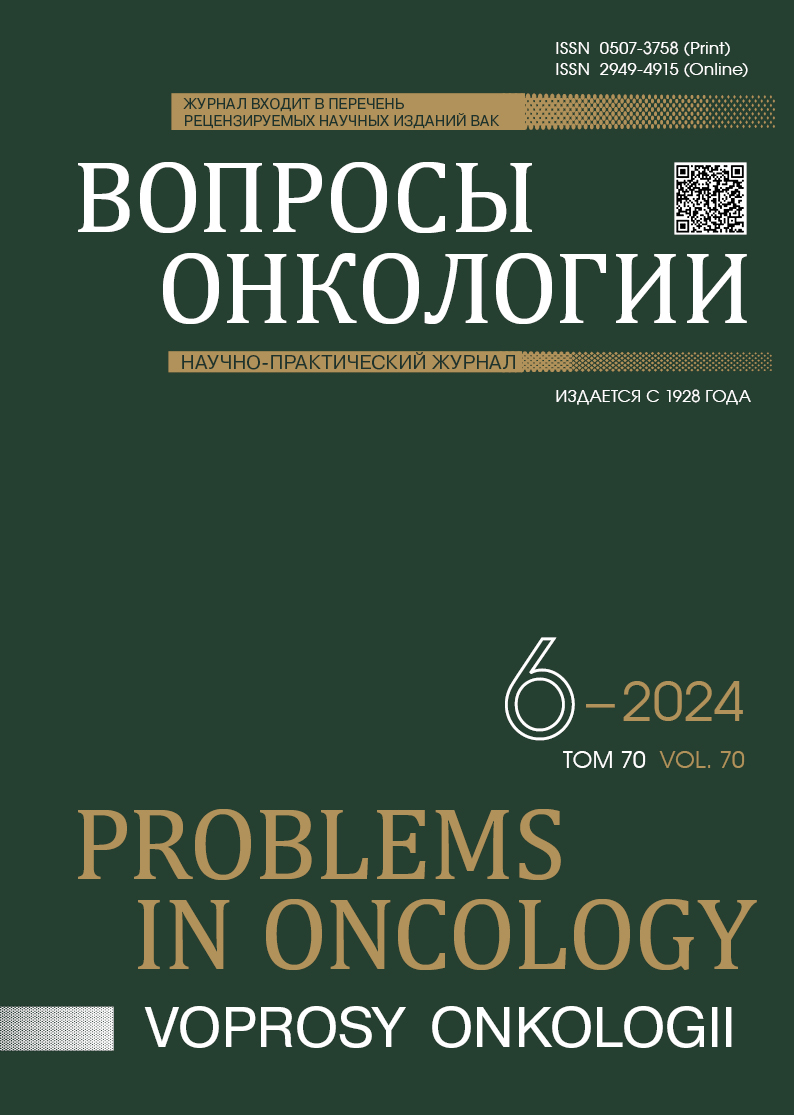Abstract
Introduction. Activating mutations in the epidermal growth factor receptor (EGFR) gene are one of the main objectives of targeted therapy in non-small cell lung cancer (NSCLC). More than 80 % of all EGFR mutations are deletions in exon 19 and the L858R substitution. The remaining 15-20 % are represented by a large number of rare somatic EGFR variants. Rare mutations are less well studied and are associated with variable sensitivity to anti-EGFR therapy.
Aim. To analyze the spectrum of uncommon EGFR mutations in Russian NSCLC patients.
Materials and methods. The study group consisted of 3 187 NSCLC cases. Deletions in exon 19, L858R substitutions, insertions in exon 20, missense variants T790M, L861Q, S768I and G719X in the EGFR gene were tested in histological tumor material using a combination of PCR methods and Sanger sequencing.
Results. EGFR mutations were detected in 497 (15.6 %) patients. The ex19del and L858R variants were present in 425 of 497 (85.5 %) EGFR-positive cases. Uncommon mutations were dominated by insertions in exon 20 (44.9 %) and double mutations represented by a combination of two rare or rare and frequent variants (25.6 %). G719X and S768I substitutions were found predominantly in combinations with other variants. The frequency of EGFR mutations was higher in women and in nonsmoking patients. However, among patients with rare mutations, the proportion of women was significantly lower than in NSCLC with two common EGFR variants (60.3 % and 78.7 %, respectively, p = 0.0005). Cases with uncommon mutations were characterized by a younger age (p = 0.009).
Conclusion. Uncommon variants account for about 15 % of all EGFR mutations in NSCLC. The most frequent type of uncommon mutations are insertions in exon 20. Combinations of two different variants (double mutations) are observed in 5 % of EGFR-mutated cases. Compared to exon 19 deletions or L858R, rare EGFR variants occur more frequently in males and in younger patients.
References
Yoshikawa S., Kukimoto-Niino M., Parker L., et al. Structural basis for the altered drug sensitivities of non-small cell lung cancer-associated mutants of human epidermal growth factor receptor. Oncogene. 2013; 32(1): 27-38.-DOI: https://doi.org/10.1038/onc.2012.21.
Harrison P.T., Vyse S., Huang P.H. Rare epidermal growth factor receptor (EGFR) mutations in non-small cell lung cancer. Semin Cancer Biol. 2020; 61: 167-179.-DOI: https://doi.org/10.1016/j.semcancer.2019.09.015.
Li K., Yang M., Liang N., Li S. Determining EGFR-TKI sensitivity of G719X and other uncommon EGFR mutations in non-small cell lung cancer: Perplexity and solution (Review). Oncol Rep. 2017; 37(3): 1347-1358.-DOI: https://doi.org/10.3892/or.2017.5409.
Zhang Y.L., Yuan J.Q., Wang K.F., et al. The prevalence of EGFR mutation in patients with non-small cell lung cancer: a systematic review and meta-analysis. Oncotarget. 2016; 7(48): 78985-78993.-DOI: https://doi.org/10.18632/oncotarget.12587.
Camidge D.R., Pao W., Sequist L.V. Acquired resistance to TKIs in solid tumours: learning from lung cancer. Nat Rev Clin Oncol. 2014; 11(8): 473-481.-DOI: https://doi.org/10.1038/nrclinonc.2014.104.
Zwierenga F., van Veggel B.A.M.H., van den Berg A., et al. A comprehensive overview of the heterogeneity of EGFR exon 20 variants in NSCLC and (pre)clinical activity to currently available treatments. Cancer Treat Rev. 2023; 120(Sep): 102628.-DOI: https://doi.org/10.1016/j.ctrv.2023.102628.
Ou S.H.I, Prawitz T., Lin H.M., et al. Efficacy of mobocertinib and amivantamab in patients with advanced non-small cell lung cancer with EGFR exon 20 insertions previously treated with platinum-based chemotherapy: an indirect treatment comparison. Clin Lung Cancer. 2024; 25(3): e145-e152.e3.-DOI: https://doi.org/10.1016/j.cllc.2023.11.011.
Borgeaud M., Parikh K., Banna G.L., et al. Unveiling the landscape of uncommon EGFR mutations in NSCLC-A systematic review. J Thorac Oncol. 2024; 19(7): 973-83.-DOI: https://doi.org/10.1016/j.jtho.2024.03.016.
Yanus G.A., Belyaeva A.V., Ivantsov A.O., et al. Pattern of clinically relevant mutations in consecutive series of Russian colorectal cancer patients. Med Oncol. 2013; 30(3): 686.-DOI: https://doi.org/10.1007/s12032-013-0686-5.
Hou J., Li H., Ma S., et al. EGFR exon 20 insertion mutations in advanced non-small-cell lung cancer: current status and perspectives. Biomark Res. 2022; 10(1): 21.-DOI: https://doi.org/10.1186/s40364-022-00372-6.
Beau-Faller M., Pencreach E., Leduc C., et al. Independent prognostic value of ultra-sensitive quantification of tumor pre-treatment T790M subclones in EGFR mutated non-small cell lung cancer (NSCLC) treated by first/second generation TKI, depends on variant allele frequency (VAF): Results of the French cooperative thoracic intergroup (IFCT) biomarkers France project. Lung Cancer. 2020; 140: 19-26.-DOI: https://doi.org/10.1016/j.lungcan.2019.10.013.
Matsumoto Y., Kawaguchi T., Watanabe M., et al. Prognostic impact of pretreatment T790M mutation on outcomes for patients with resected, EGFR-mutated, non-small cell lung cancer. BMC Cancer. 2022; 22(1): 775.-DOI: https://doi.org/10.1186/s12885-022-09869-7.
Chen Z., Feng J., Saldivar J.S., et al. EGFR somatic doublets in lung cancer are frequent and generally arise from a pair of driver mutations uncommonly seen as singlet mutations: one-third of doublets occur at five pairs of amino acids. Oncogene. 2008; 27(31): 4336-4343.-DOI: https://doi.org/10.1038/onc.2008.71.
Yavuz B.R., Tsai C.J., Nussinov R., Tuncbag N. Pan-cancer clinical impact of latent drivers from double mutations. Commun Biol. 2023; 6(1): 202.-DOI: https://doi.org/10.1038/s42003-023-04519-5.
Kobayashi Y., Mitsudomi T. Not all epidermal growth factor receptor mutations in lung cancer are created equal: Perspectives for individualized treatment strategy. Cancer Sci. 2016; 107(9): 1179-1186.-DOI: https://doi.org/10.1111/cas.12996.
Wu S.G., Chang Y.L., Yu C.J., et al. Lung adenocarcinoma patients of young age have lower EGFR mutation rate and poorer efficacy of EGFR tyrosine kinase inhibitors. ERJ open Res. 2017; 3(3).-DOI: https://doi.org/10.1183/23120541.00092-2016.
Imyanitov E.N., Demidova I.A., Gordiev M.G., et al. Distribution of EGFR mutations in 10,607 Russian patients with lung cancer. Mol Diagn Ther. 2016; 20(4): 401-406.-DOI: https://doi.org/10.1007/s40291-016-0213-4.
Morita C., Yoshida T., Shirasawa M., et al. Clinical characteristics of advanced non-small cell lung cancer patients with EGFR exon 20 insertions. Sci Rep. 2021; 11(1): 18762.-DOI: https://doi.org/10.1038/s41598-021-98275-3.
Wang T., Cao J., Song Q., et al. Structure-based classification of EGFR mutations in operable pre-invasive and invasive non-small cell lung cancer: a cross-sectional study. J Thorac Dis. 2022; 14(9): 3508-3516.-DOI: https://doi.org/10.21037/jtd-22-1054.

This work is licensed under a Creative Commons Attribution-NonCommercial-NoDerivatives 4.0 International License.
© АННМО «Вопросы онкологии», Copyright (c) 2024

